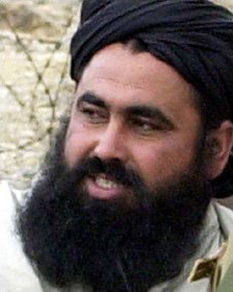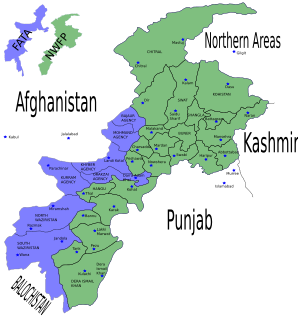Related Research Articles

Baitullah Mehsud was a leading member of TTP in Waziristan, Pakistan, and the leader of the Tehrik-i-Taliban Pakistan (TTP). He formed the TTP from an alliance of about five militant groups in December 2007. He is thought by U.S. military analysts to have commanded up to 5,000 fighters and to have been behind numerous attacks in Pakistan including the assassination of Benazir Bhutto which he and others have denied.

Jalaluddin Haqqani was an Afghan insurgent commander who founded the Haqqani network, an insurgent group fighting in guerilla warfare against US-led NATO forces and the now former government of Afghanistan they support.

Sirajuddin Haqqani is an Afghan Islamist militant who has been serving as the first deputy leader of the Islamic Emirate of Afghanistan (Taliban) since 2016. Since the 2021 fall of Kabul, this position has made him the de facto first deputy head of state of Afghanistan.

The insurgency in Khyber Pakhtunkhwa, formerly known as the War in North-West Pakistan and also Pakistan's war on terror, is an ongoing armed conflict involving Pakistan, and Islamist militant groups such as the Tehrik-i-Taliban Pakistan (TTP), Jundallah, Lashkar-e-Islam (LeI), TNSM, al-Qaeda, and their Central Asian allies such as the ISIL–Khorasan (ISIL), Islamic Movement of Uzbekistan, East Turkistan Movement, Emirate of Caucasus, and elements of organized crime. Formerly a war, it is now a low-level insurgency as of 2017.
This is a list of aviation-related events from 2008:
Abu Hamza Rabia was an Egyptian member of al-Qaeda, described in news accounts as a high-ranking leader within the organization's hierarchy. His death in a surprise CIA drone attack was widely reported by media outlets around the world.

Qari Hussain Ahmad Mehsud was a top lieutenant in the Tehrik-i-Taliban Pakistan (TTP) and the organizer of the group's suicide bombing squads. He was a cousin of Hakimullah Mehsud.

Tehrik-i-Taliban Pakistan, commonly known as the Pakistani Taliban, is an umbrella organization of various Islamist armed militant groups operating along the Afghan–Pakistani border. Formed in 2007 by Baitullah Mehsud, its current leader is Noor Wali Mehsud, who has publicly pledged allegiance to the Afghan Taliban. The Pakistani Taliban share a common ideology with the Afghan Taliban and have assisted them in the 2001–2021 war, but the two groups have separate operation and command structures.
The Haqqani network is an Afghan Islamist guerrilla insurgent group, built around the family of the same name, that has used asymmetric warfare in Afghanistan to fight against Soviet forces in the 1980s, and US-led NATO forces and the Islamic Republic of Afghanistan government in the 21st century. It is considered to be a "semi-autonomous" offshoot of the Taliban. It has been most active in eastern Afghanistan and across the border in north-west Pakistan.
Between 2004 and 2018, the United States government attacked thousands of targets in Northwest Pakistan using unmanned aerial vehicles (drones) operated by the United States Air Force under the operational control of the Central Intelligence Agency's Special Activities Division. Most of these attacks were on targets in the Federally Administered Tribal Areas along the Afghan border in Northwest Pakistan. These strikes began during the administration of United States President George W. Bush, and increased substantially under his successor Barack Obama. Some in the media referred to the attacks as a "drone war". The George W. Bush administration officially denied the extent of its policy; in May 2013, the Obama administration acknowledged for the first time that four US citizens had been killed in the strikes. In December 2013, the National Assembly of Pakistan unanimously approved a resolution against US drone strikes in Pakistan, calling them a violation of "the charter of the United Nations, international laws and humanitarian norms."

Maulvi Nazir was a leading militant of the Pakistani Taliban in South Waziristan. Nazir's operations were based in Wana.

Hakimullah Mehsud, born Jamshed Mehsud and also known as Zulfiqar Mehsud, was a Pakistani militant who was the second emir of Tehrik-i-Taliban Pakistan. He was deputy to commander Baitullah Mehsud and one of the leaders of the militant group Fedayeen al-Islam prior to the elder Mehsud's death in a CIA drone missile strike.
Hafiz Gul Bahadur is the leader of a Pakistani Taliban faction based in North Waziristan. Upon the formation of the Tehrik-i-Taliban Pakistan (TTP) in December 2007, he was announced as the militant group's overall naib amir under Baitullah Mehsud, who was based in South Waziristan, but has largely distanced himself from the TTP due to rivalries with Mehsud and disagreements about the TTP's attacks against the Pakistani state.

Wali-ur-Rehman was a senior Tehrik-e-Taliban Pakistan (TTP) commander based in South Waziristan. Wali-ur-Rehman was formerly a spokesman for Baitullah Mehsud, the late leader of the TTP.

Ilyas Kashmiri, also referred to as Maulana Ilyas Kashmiri and Muhammad Ilyas Kashmiri, was a Pakistani ex-Special Forces Islamist guerrilla insurgent who fought against India in Kashmir.
The Datta Khel airstrike was an American airstrike carried out on 17 March 2011 in Datta Khel, North Waziristan that killed 44 people and led to widespread condemnation in Pakistan. Sherabat Khan Wazir, a top commander of Hafiz Gul Bahadur's Taliban faction, was killed in the strike, and in response Bahadur threatened to end the peace deal struck with the Pakistani government almost four years earlier. The airstrike was part of a long series of drone attacks in Pakistan carried out by the CIA and United States military. It occurred just two days after diyya, a form of compensation paid to a victim's family under Islamic law, was paid for the release of U.S. CIA operative Raymond Allen Davis, signaling a resumption of U.S. activity after a several week hiatus while Davis' pardon on murder charges was being negotiated.
Haji Mali Khan is an Afghan Taliban politician, and former military commander. Khan is currently serving as Deputy Chief of Staff of the Armed Forces since 4 March 2022. From 7 November 2021 to 14 March 2022, he served as governor of Logar Province. Prior to his governmental service, he was considered one of the leaders of the Haqqani network, a "semi-autonomous" offshoot of the Taliban.
Mullah Sangeen Zadran was an Afghan militant and shadow governor of Paktika province. Zadran was an operational commander of the Haqqani network, an Islamist insurgent group. He was held responsible for the capture of American soldier Bowe Bergdahl. In 2011, he was added to the list of specially designated global terrorists by the United States of America. According to the U.S. military, Zadran was the leader of one of the most resilient militant groups based in Afghanistan. He was killed in a CIA drone strike on 5 September 2013. His younger brother, Bilal Zadran, was nominated as the new official commander of the Haqqani group. A photo of Sangeen's corpse was published on a jihadist forum in October 2013.

Operation Zarb-e-Azb was a joint military offensive conducted by the Pakistan Armed Forces against various militant groups, including the Tehrik-i-Taliban Pakistan (TTP), the Islamic Movement of Uzbekistan, the East Turkestan Islamic Movement, Lashkar-e-Jhangvi, al-Qaeda, Jundallah and the Haqqani network. The operation was launched on 15 June 2014 in North Waziristan along the Pakistan-Afghanistan border as a renewed effort against militancy in the wake of the 8 June attack on Jinnah International Airport in Karachi, for which the TTP and the IMU claimed responsibility. As of 14 July 2014, the operation internally displaced about 929,859 people belonging to 80,302 families from North Waziristan.
References
- 1 2 3 "Drone Attack Kills a Senior Militant Leader in Pakistan". The New York Times. 13 October 2011. Retrieved 13 October 2011.
- ↑ "US kills Haqqani Network's 3rd in command in North Waziristan strike". The Long War Journal. 13 October 2011. Archived from the original on 16 October 2011. Retrieved 13 October 2011.
- 1 2 3 "The Battle for Pakistan: Militancy and Conflict in North Waziristan" (PDF). New America Foundation. April 2010. Archived from the original (PDF) on 14 October 2011. Retrieved 13 October 2011.
- ↑ "Drone attack in Pakistan kills Haqqani commander". Agence France-Presse. 13 October 2011. Archived from the original on 31 March 2013. Retrieved 13 October 2011.
- ↑ "US drone attack kills four in Pakistan: officials". Dawn. 14 October 2011. Archived from the original on 15 October 2011. Retrieved 15 October 2011.